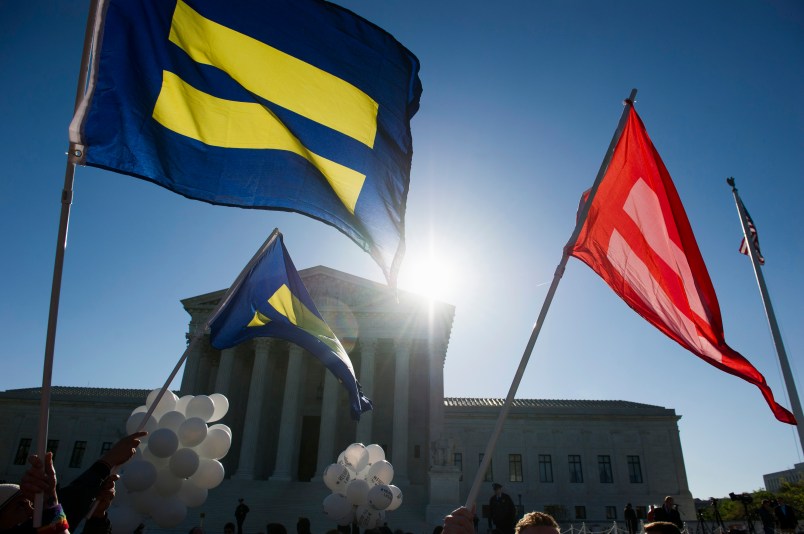The Supreme Court on Tuesday begins hearing oral arguments in a case that could open the door to gay marriage across the nation.
The two and a half hour session in the case of Obergefell v. Hodges comes a few months before the high court is expected to hand down a decision, in June, which could end up allowing gay couples the same marriage rights as heterosexual couples.
Obergefell v. Hodges actually comes from a Sixth Circuit Court of Appeals decision upholding gay marriage bans in Kentucky, Ohio, Michigan, Tennessee. The gay marriage bans in those states were upheld by a Cincinnati federal appeals court late last year. That court’s ruling was the only one to uphold gay marriage since the high court’s 2013 decision partially striking down the federal gay marriage ban.
Justice Anthony Kennedy has written the court’s three prior gay rights decisions, including the case from two years ago. He’s been the justice repeatedly inching the high court toward legalizing gay rights. All eyes will be on Kennedy for any signals that he is prepared to take the final step in granting marriage rights to same-sex couples.
Specifically, the justices will consider whether gay marriage bans in the four states violate the 14th Amendment. They will also explore whether, through the 14th Amendment, a state must recognize a gay couple that was married in a different state.
Currently, gay couples can legally marry in 36 states plus the District of Columbia. Thirteen other states, currently, don’t allow same-sex marriage. The status in Alabama is uncertain because of differing state court and federal court orders.







IF all they do is rule that every state must recognize a marriage (same-sex or not) entered into in another state, then they pretty much put the kibosh on the bans because they then become pretty useless. All they have to do is uphold Loving v Virginia.
Not ONLY wiLL gaY MArry destrOY tradiTIONAL maRRY but IT wILL caUSE EPIC divORCes LIke MINE AND KIDs WHO wILL Be REcrUITed IN The gaY LIFestyLE sINCE GAYs CAN’t HAVe CHILdren. SODOM and GOMorrah!1!!!one!!!1!!!
I hope I live long enough to see all the social conservatives 50 years from now, when gay marriage is a long-settled and accepted issue in this country, pretending that conservatism has always been for gay marriage, and it was really they all along who were the gay rights pioneers.
For Christ’s sake, Daniel, get your facts straight. First of all, you mean “uphold gay marriage bans”, not “uphold gay marriage”.
Second, Section 3 of DOMA wasn’t a “federal gay marriage ban”. It simply prohibited the federal government from recognizing legal same-sex marriages for the purposes of any federal benefits:
This does not prohibit same-sex marriage so it can’t be a “ban”. The federal government doesn’t issue marriage licenses. This law simply prohibited the federal government from recognizing same-sex marriages for any federal purpose.
Sloppy writing indicates sloppy thinking.
I think the more interesting result fifty years down the road is that progressives of today may be the social conservatives of tomorrow.